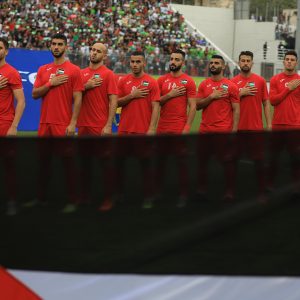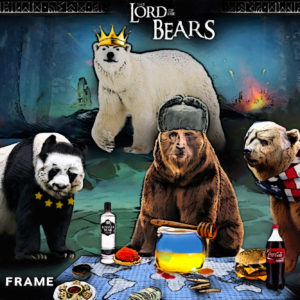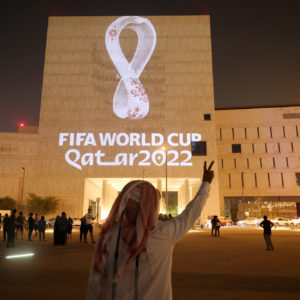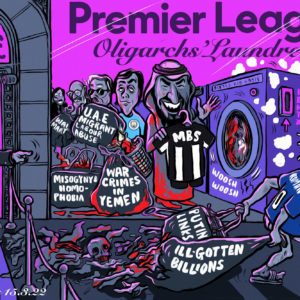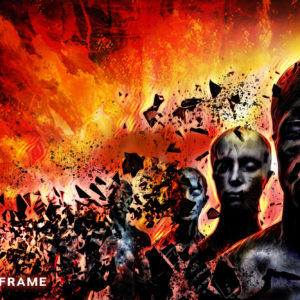Will sport punish all murderous governments?
Sporting bodies across disciplines moved swiftly to punish Russia for its invasion of Ukraine. Their stances, however, reveal sport’s hypocrisy when it comes to which lives it values.
Author:
18 March 2022
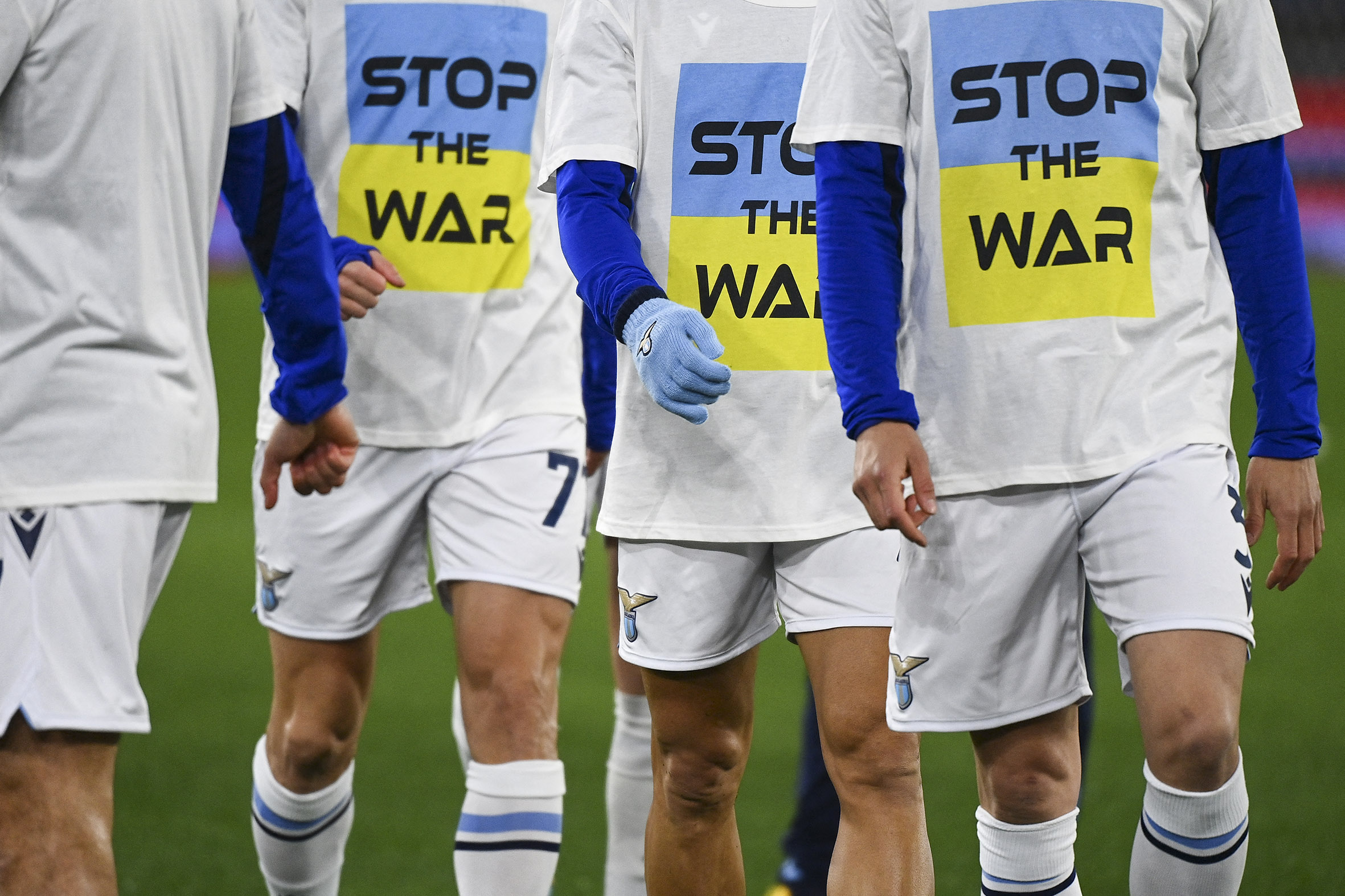
Initially slow out of the blocks, the sporting community has gathered pace in its condemnation of Russia’s invasion of Ukraine and of Belarus’ role in facilitating the assault. Led by an appeal from the International Olympic Committee (IOC), Fifa, Uefa, World Rugby, Formula 1 and other sporting bodies have imposed sanctions on Russian and Belarusian athletes and teams.
This year’s Uefa Champions League final has been moved from St Petersburg in Russia to France, a country whose military was forced out of Mali after nine years in its former colony. Russians and Belarusians were barred from competing in the Paralympics that concluded on 13 March in Beijing, China. Both nations have also been erased from video games Fifa 22 and the ice hockey game NHL 22.
But as bombs fall and the death toll rises, the sporting world and those who occupy it face difficult questions: What role did sport play in emboldening a despot? Will these measures of exclusion have any bearing on a dictator or the people under his rule? And if a red line has indeed been crossed, what precedent does this set regarding belligerents of current and future conflicts?
Related article:
The first question is the easiest to answer. As anti-apartheid activists made abundantly clear, there should be no normal sport in an abnormal society. And yet, all too often, the abnormality of a society is cloaked under the facade of normal sport. Graves filled with corpses seldom halt the bouncing of balls. Starting guns are not silenced by the rattles of AK-47 assault rifles.
There is a perverse romance in that. One of sport’s appeals is that it elevates participants and witnesses above the grimness of everyday life. Sport offers joy where there is none. It is a torch in the darkness, a comforting finish line at the end of a long slog. But what role does sport play in facilitating violence?
The term sportswashing is a recent invention, but the practice of a state or corporation improving its tarnished reputation through the acquisition of teams, winning competitions or staging global events has long been in practice.
The fascist regimes of the early 20th century knew this well. Benito Mussolini poured state resources into totemic stadiums that are still used by Italian national teams today, and the Berlin Olympic Games of 1936 were the embodiment of the muscular jingoism peddled by the Nazis. Though not an avid sport fan himself, Adolf Hitler knew sport was “the fastest and most sustained means of confounding political troublemakers and rabble-rousers”.
Macho Putin
Vladimir Putin is a disciple of this doctrine. Russia’s president is a veteran of the Cold War, in which both sides used sport to push their political agenda. The Cold War came to an end in 1989, and while it initially seemed that Russia would be brought into the ambit of the West there is now a new cold war afoot between these old enemies. This has not just played out in terms of the expansion of Nato and interventions in the politics of countries close to Russia. Sport remains a site of political contestation.
Putin watched the Soviet Union use sport as a means to challenge, and defeat, the United States and its allies in front of a global audience. As proxy wars between the two superpowers raged, the Soviet Union ranked first in 13 of the 18 Summer and Winter Olympics between 1952 and 1988, placing second in all the rest except for the Los Angeles Games of 1984, which it boycotted.
Putin has always portrayed himself as a strong man, physically as well as temperamentally. There he is riding a horse without a shirt. There he is swimming in wild rivers like a brown bear on a salmon hunt. There he is scoring goals on an ice hockey rink, grappling on a judo mat and skiing down a mountain at high speed. These staged images presented a clear challenge to dissenters: how can Russia be weak when its leader is not?
Related article:
Participation was not enough. Putin needed to play host if he was to convince the world that his authoritarian state was a valuable member of the international community. He personally attended an IOC session in Guatemala in 2007 and convinced delegates to award the 2014 Winter Olympics to Sochi, which had just a single functioning ski lift at the time.
In 2008, while the Summer Games were taking place in Beijing, Putin invaded the sovereign state of Georgia. Shortly after the Sochi Games began, Putin was again on the warpath, annexing Crimea from Ukraine. For Putin, sport is both a platform and a smokescreen.
But sport is not blameless. As Kieran Pender writes in The Guardian newspaper, “history will judge the IOC and Fifa as complicit hypocrites”. The two most recent Fifa World Cups have been staged in Brazil and Russia, with this year’s showpiece kicking off in Qatar – all three governments have been reported for their poor human rights records.
Related article:
The 2026 Fifa World Cup will be jointly hosted by Canada, Mexico and the US, which is responsible for the death of millions across Asia and Africa, including removing democratically elected leaders. Three of the past five Olympic Games have been hosted by dictatorships, with the fourth – London in the United Kingdom – being a government that was complicit in the brutal invasion of Afghanistan and one that supplies arms to some of the most oppressive and violent regimes in the world.
IOC president Thomas Bach advocated for his organisation’s indifference last month by saying: “If we get in the middle of intentions and disputes and confrontations of political powers, then we are putting the Games at risk.” This is an egregious take requiring the sort of back-bending that would rival gymnast Simone Biles. Leniency and appeasement have placed the world at risk. The Olympic Games would not survive a nuclear holocaust.
What’s more, the IOC bestowed the Olympic Order, its highest honour, on Putin in 2001, as well as one each on his deputy prime minister and his chief of staff. Fifa president Gianni Infantino, until recently a staunch admirer of Putin, once accused “Western media” of “distorting reality” when it came to reporting Kremlin edicts and allegations of state-sponsored doping. Those allegations proved to be true. The IOC’s punishment was lukewarm and still allowed Russian athletes to compete under the thinly veiled guise of the Russian Olympic Committee.
Sport has power
Powerful people seek the soft power that sport affords them because it works. It is not always obstructive. Nelson Mandela used sport to unite a fractured South Africa tiptoeing out of the wreckage of apartheid. Critics have since accused him of placating white sensibilities by endorsing the sport teams that served the National Party, but there is no denying the galvanising force that sport played in the early years of democracy. For good or evil, the games we play sway public opinion.
Which is why sanctions on sport work. They do not bite as hard as economic blockades, but cultural restrictions on a nation shift the dial and make visible that which would otherwise be shrouded in the fog of war. Sport is unrivalled in its ability to penetrate political and social divides. It thrusts difficult conversations into homes that might ordinarily avoid them.
The efficacy of these sanctions hinges on the way policymakers are impacted by the will of the people as well as their own regard for sport. Prominent Russian athletes including tennis star Andrey Rublev and ice hockey great Alex Ovechkin have called for peace. But Putin has underlined his disdain for democracy, murdering opposition leaders and arresting protesters. Would a year or two without a football match move the needle at all?
Related article:
Thousands of brave Russians flooded the streets of Moscow and St Petersburg demanding an end to the violence. They have already felt the sting of the global backlash. The rouble has hit an all-time low as Russia’s financial system teeters on the brink of collapse. If Putin is swayed from this madness, it will unlikely be the result of his exclusion from sport.
But whether these punishments work or not is perhaps irrelevant to the final question that this episode raises. If sport practitioners, administrators and fans believe that Russia crossed a rubicon, what is the party line regarding combatants in other theatres? Is it even possible to conceive of a sport boycott against the US in response to its wars, coups and bombing campaigns?
In the same week that Russian troops marched on Kyiv and Kharkiv, more than 30 people were killed in a single battle between Houthi rebels and Yemeni government soldiers. This was a single flashpoint in a war orchestrated by Saudi Arabia – with weapons supplied by Britain, France, Italy and Australia – that has claimed more than 91 000 lives since 2015. The US also launched a drone strike in Somalia. A week earlier, Israeli soldiers used force on Palestinians protesting the eviction of their countrymen and women in the occupied West Bank.
A chance to change
Whataboutism is almost always unhelpful. It diminishes the plight of those who suffer simply because other people are suffering simultaneously. It also demands that we spread our dismay and anger evenly. This is an impossible task.
But whataboutism is worth considering in this case. What about Saudi Arabia being given the green light to purchase English football club Newcastle United? What about Israeli basketball and football teams competing in European competitions? What about English athletes aiming for gold in the Olympics? What about Paris and Los Angeles being the next two host cities of the Olympics despite their national governments’ murderous ways? And what about China? Why should Xi Jinping be granted the privilege of hosting Olympic Games in his country despite what his government is doing to Uighur Muslims?
The answer is blatant. Ukraine is a European nation. Its citizens are overwhelmingly white. When reporting from Kyiv, CBS News senior foreign correspondent Charlie D’Agata said that the country “isn’t a place, with all due respect, like Iraq or Afghanistan, that has seen conflict raging for decades. This is a relatively European – I have to choose those words carefully, too – city, one where you wouldn’t expect that, or hope that it’s going to happen”.
D’Agata hasn’t been the only one. Philippe Corbé of France’s BFMTV said: “We’re not talking here about Syrians fleeing the bombing of the Syrian regime backed by Putin. We’re talking about Europeans leaving in cars that look like ours to save their lives.” An Al Jazeera news anchor described those escaping the conflict as “middle-class people” who were “not obviously refugees looking to get away from areas in the Middle East that are still in a big state of war. These are not people trying to get away from areas in North Africa.”
Related article:
Politicians have echoed this racism. Austrian chancellor Karl Nehammer, a hardliner against the resettlement of Afghan asylum seekers in his country, said: “Of course we will take in refugees if necessary. It’s different in Ukraine than in countries like Afghanistan. We’re talking about neighbourhood help.”
The harrowing images of bombed-out homes and families huddled in makeshift shelters contextualises sport. These are just games. But their power to move masses of people is alluring for those who wish to do so. Sport has contributed to this mess. Just as it has so many times before. Sport can also contribute to its clean-up.
This atrocity committed by a tyrant offers sport an opportunity for self-reflection. The UK government has seized all assets of Russian billionaire Roman Abramovic, including Chelsea football club, for his connection to Putin and the English Premier League is reportedly considering adding a human rights component to its owners’ and directors’ test. Too late to walk back on the takeover of Newcastle by a regime that dismembers journalists, carpet-bombs civilians and on 12 March executed 81 people, but it is at least a step in the right direction.
Whatever the outcome in Ukraine, a thread has been tugged, unravelling sport’s entanglement with geopolitics. We may yet see more knots loosen as this sorry saga unfolds.

